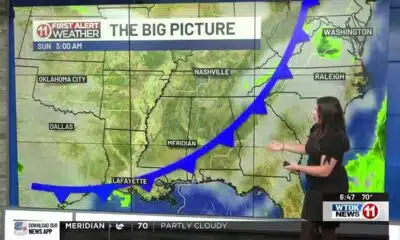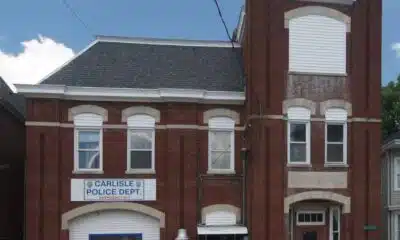News from the South - North Carolina News Feed
What is Chronic Venous Insufficiency? Will Trump be okay?
SUMMARY: President Trump has been diagnosed with chronic venous insufficiency, a common condition in people over 70 causing leg swelling due to blood pooling in veins. The White House confirmed no deep vein thrombosis, arterial disease, or heart issues were found, with normal cardiac function and no signs of systemic illness. Despite visible ankle swelling and bruised hands, attributed to frequent handshaking and aspirin use, the president remains in excellent health and experiences no discomfort. At 79, he stays active, working continuously. The White House emphasized these symptoms are minor and consistent with his busy public engagements and cardiovascular prevention measures.
Swollen legs led to President Donald Trump being diagnosed with what’s called chronic venous insufficiency. It’s a fairly common condition among older adults but requires a thorough checkup to rule out more serious causes of swelling in the legs. Here are some things to know.
Chronic venous insufficiency, or CVI, happens when veins in the legs can’t properly carry blood back to the heart. That can lead to blood pooling in the lower legs. In addition to swelling, usually around the feet and ankles, symptoms can include legs that are achy, heavy feeling or tingly, and varicose veins. Severe cases could trigger leg sores known as ulcers.
WRAL App: https://www.wral.com/download-wral-apps/5787234/
The Latest Weather: https://www.wral.com/weather/page/1010362/
News Tips:
Online – https://www.wral.com/report-it/
Email – assignmentdesk@wral.com
Subscribe to WRAL:
https://youtube.com/c/wral5
Follow WRAL:
Facebook: https://facebook.com/WRALTV
X: https://twitter.com/WRAL
IG: https://instagram.com/wral
About WRAL-TV:
WRAL is your Raleigh, North Carolina news source. Check out our videos for the latest news in Raleigh, local sports, Raleigh weather, and more at https://WRAL.com
#localnews #northcarolina
News from the South - North Carolina News Feed
Crops bountiful on NC farms in ’25, but recovery from ’24 still lags
The news about crops out of North Carolina farms is good this year: the corn is tall, the soybeans leafy, the cotton fluffy and the apples ripe.
Compared to last year’s disastrous summer, when it seemed flooding was the only relief from extreme drought, this summer has left farmers feeling hopeful. In Wayne County, extension agent Daryl Anderson says this is the best corn crop the county has seen in 50 years.
[Subscribe for FREE to Carolina Public Press’ alerts and weekend roundup newsletters]
That’s a major turnaround from last year, when dry conditions decimated cornfields from the coast to the mountains.
Still, no year in the fields is free of struggle. Rainy weather, delayed relief payments, market conditions and dramatic federal policy shifts have kept farmers on their toes.

It’s been a wet year — at times, too wet. Tropical Depression Chantal flooded fields in Central North Carolina in early July. Unusually wet conditions all summer hurt the tobacco crop across the state.
Plus, state relief money for the tribulations of 2024 is coming slow. The legislature just approved an additional $124 million to address last year’s agricultural disasters, but farmers still haven’t received the money originally allocated to the Ag Disaster Crop Loss Program in March.
For Henderson County extension director Terry Kelley, the money is an urgent matter. In Kelley’s neck of the woods, apple farmers are still recovering from the devastation Helene wrought on their orchards. Finances are starting to spiral out of control for many.
“Our farmers are really anxious to get that money,” Kelley told Carolina Public Press.

“They’ve got bills due from last year. They’ve used their credit up to their limit and beyond. We need that money. It’s been a long summer of waiting.”
Though Helene upped the ante in the West, Kelley’s anxieties are felt across North Carolina. In Bladen County, where many 2024 crops were devastated by Tropical Storm Debbie, extension agent Matthew Strickland says there’s been a dearth of information about how the program works.
“We are not sure when those payments will be issued and exactly how they will be calculated,” Strickland said. “We were told they’d go out mid-summer. There’s been no update. Who knows when they’ll go out? Nobody really knows.”
The financial pressure extends beyond those delayed relief payments. North Carolina farmers find themselves at the whim of unexpected shifts in both the market and federal policies.
Though both quality and yield are high for field crops this year, the price of those crops at market is low. Meanwhile, input costs continue to rise. This makes for an unsettling financial equation for farmers.
Plus, President Donald Trump’s tariffs have made American crops less desirable overseas, according to Strickland. Before recent tariff hikes, lots of North Carolina corn, soybeans and tobacco made its way to China. Now, not as much.
“With the political trade wars, we’re really worried when it comes to our soybeans and tobacco,” Surry County extension agent Ryan Coe told CPP. “A lot of farmers are still waiting to see what’s going to happen. We don’t have a crystal ball.”
The tariffs haven’t been all bad, though. While some crops suffer, others have found opportunities. Kelley says the lack of Mexican tomatoes on the market has created a higher demand for local Henderson County tomatoes, for example.
Labor, too, is giving farmers pause. Many rely on legal migrant workers, but the Trump administration’s strict immigration policies have tightened the market.
“It’s more difficult now to get labor, even with legal workers,” Kelley said. “It’s not available as it once was, and it’s terribly expensive.”
That’s because wages for migrant workers on legal H-2A visas continue to rise. In North Carolina, farmers must now pay migrant workers $16.16 per hour. This number is called an Adverse Effect Wage Rate, and it’s designed to ensure that wages for American workers don’t fall.

There’s a chance, however, that going forward, North Carolina farmers may have a bigger say in American agricultural policies.
The U.S. Department of Agriculture is moving major operations to Raleigh, in an effort to bring the department closer to the nation’s farming hubs. Some North Carolina farmers are excited about it.
“Having the USDA in this area will be good for all farmers in North Carolina,” said Mikayla Berryhill, an extension agent in Person County, where farms were flooded by Chantal’s heavy rains. “We will be able to show them what specific problems we have here in North Carolina and get help with those.”
In the meantime, it looks like it will be a bountiful harvest of crops here in North Carolina. This fall’s agritourism attractions, from corn mazes and county fairs to hay rides and apple markets, should reflect that agricultural resilience.
This article first appeared on Carolina Public Press and is republished here under a Creative Commons Attribution-NoDerivatives 4.0 International License.
The post Crops bountiful on NC farms in ’25, but recovery from ’24 still lags appeared first on carolinapublicpress.org
Note: The following A.I. based commentary is not part of the original article, reproduced above, but is offered in the hopes that it will promote greater media literacy and critical thinking, by making any potential bias more visible to the reader –Staff Editor.
Political Bias Rating: Centrist
The content presents a balanced and factual overview of agricultural conditions in North Carolina, highlighting both challenges and positive developments without evident partisan framing. It discusses impacts of federal policies, including tariffs and immigration enforcement under the Trump administration, in a straightforward manner without overt criticism or praise. The article focuses on practical issues affecting farmers, such as weather, market conditions, and government relief efforts, maintaining a neutral tone throughout.
News from the South - North Carolina News Feed
Federal tax credits, other awards spur development of more than 5,000 affordable apartments in NC
SUMMARY: North Carolina is addressing its affordable housing shortage through federal tax credits, tax-exempt bonds, and state loans to build and rehab 5,012 affordable apartments valued at nearly $1.5 billion across over two dozen counties. The N.C. Housing Finance Agency selected 50 projects from 74 applications, including units for families, seniors, and people with disabilities. The Workforce Housing Loan Program, crucial for rural and moderate-income areas, received $34.7 million for 28 projects but faces uncertain future funding. Advocates warn that without its restoration, developments may concentrate in urban areas, limiting rural housing options and disaster recovery efforts. The initiative supports thousands of jobs and significant tax revenue.
The post Federal tax credits, other awards spur development of more than 5,000 affordable apartments in NC appeared first on ncnewsline.com
News from the South - North Carolina News Feed
Epstein victims, family members speak exclusively with NBC
SUMMARY: Survivors of Jeffrey Epstein and their families are meeting with lawmakers, demanding justice and the release of all DOJ files related to Epstein. Despite the Trump administration claiming no new information exists, survivors say they have been ignored and unprotected. The House Oversight Committee released over 30,000 pages of Epstein files, mostly public already, while a bipartisan petition seeks full disclosure. Survivors emphasize the need for accountability and urge President Trump to rule out a pardon for convicted co-conspirator Ghislaine Maxwell, who is serving a 20-year sentence but was recently moved to a lower-security prison. They seek justice and protection for victims.
Survivors of the late sex offender Jeffrey Epstein and family members of those women are spending two days talking with lawmakers. Members of Congress are pushing for the DOJ to release all files related to Epstein — despite the Trump administration saying there’s nothing new in those files. In an NBC exclusive, one group of survivors shares what justice would look like for them
-
Mississippi Today5 days ago
DEI, campus culture wars spark early battle between likely GOP rivals for governor in Mississippi
-
Local News Video6 days ago
08/29 Ryan's “Wet End to the Week” Friday Forecast
-
News from the South - Kentucky News Feed7 days ago
Lexington Man Convicted of Firearms Offenses
-
The Center Square7 days ago
Extended Secret Service protection canceled for Kamala Harris | National
-
News from the South - Louisiana News Feed4 days ago
‘They broke us down’: New Orleans teachers, fired after Katrina, reflect on lives upended
-
News from the South - South Carolina News Feed6 days ago
Trump revokes Secret Service protection for former Vice President Harris after Biden had extended it
-
News from the South - Missouri News Feed3 days ago
Missouri joins dozens of states in eliminating ‘luxury’ tax on diapers, period products
-
News from the South - Florida News Feed7 days ago
Florida’s springs threatened by pollution, development and climate change












































